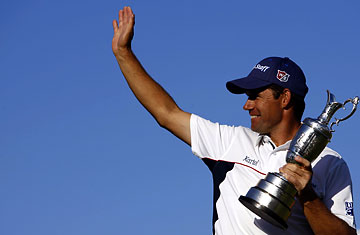
Padraig Harrington celebrates victory at the 137th British Open Championship
In the middle of the fairway of the final hole of the British Open golf championship on Sunday, in one of the sport's most tense moments, Padraig Harrington's caddy broke the Irish golfer's routine with an interjection. "Happy?" he asked. Harrington was majestically unfazed. "Yep," he shot back before firing off an iron shot that soared to within 15 feet of the hole and sealed his victory.
The 137th Open Championship at Royal Birkdale near Liverpool was not supposed to be a joyous affair. Going into the final day's play, in fact, all signs suggested a narrative of torment, inner demons and redemption in the clutches of the body's inexorable decline. That was all taking place in the livin'-large form of 53-year-old third-round leader Greg Norman. But on the final day, the Australian thrashed and grimaced his way to yet another near-miss at a major championship. As one of golf's great comeback stories unraveled in Birkdale's wispy rough, it was a chap named Paddy, with a big grin and sparkling eyes, who stole the show.
"I'm absolutely trilled," Harrington said in his trademark Irish brogue after his victory, before adding, characteristically, "I'm quite enjoying this [acceptance speech]. I don't think I'll get off the stage."
As Harrington spoke, Norman was nowhere to be seen. But the Australian's distinct silhouette — those wide but somehow brooding shoulders, that haunted, hawklike face — was the leitmotif of the tournament. Three weeks after he married tennis great Chris Evert, Norman had defied all expectations by displaying three rounds of breathtaking golf redolent of the form that won him British Open Championships in 1986 and 1993. But his final-round 77 and tied third-place finish behind England's Ian Poulter further cement his standing as golf's most heartbreaking avatar of almost-but-not-quite. Yesterday included, Norman has now led seven times going into the final day of a major without going on to win (his only front-of-the-pack victory was at Turnberry in 1986). He will remain one of the sport's great tragic figures, his career marked by bad luck (consider the 1987 Masters, when Larry Mize miraculously holed a 140-foot chip shot in a sudden-death playoff) but also an inner flaw linked to overreaching (see the final round of the 1996 Masters, when a six-stroke lead turned into a five-stroke loss).
But Norman leaves an important legacy as one of the rare golfers who changed the way the game was played. He was the first to introduce the high, straight, towering ball flight that has come to characterize the modern game. Norman's combination of altitude and distance allowed him to be the first to move successfully from a golf ball made of Balata rubber to two- and three-piece synthetic balls that offered greater distance but less spin — a change as revolutionary to golf as metal racquets were to tennis.
Now almost all professional golfers play the game the way Norman did, with the balls he helped introduce. Harrington's approach shots to the par-5 15th and 17th holes on Sunday — the latter of which set up an eagle that put him out of reach — were Normanesque in their distance and unwavering accuracy. But even the primary practitioner of modern golf couldn't overcome Harrington's ability to fuse flawless technique with sunny implacability. Sports psychologist Bob Rotella — who reportedly stayed in Harrington's house this whole week of the Open — says the key to golf is to enjoy the journey rather than obsessing over its outcome. Harrington seems to have taken that to heart.
Ironically, Harrington has earned this mental strength through a tale of redemption. His plodding, mulish gait and mechanical style led many to label him a "journeyman" even before his 30th birthday, and for many years he was a consistent nearly-man, just like Norman. Between his first professional victory, in 1998, and his second two years later, he recorded nine runner-up finishes. When he finally did break through in a major championship, with a victory in a playoff of the British Open last year at Carnoustie, it was only after recovering from a disastrous double bogey on the final hole of regulation play.
So on Sunday, Harrington had what Norman, with his prestigious talent, giant ego and multimillion-dollar business empire, never managed: perspective. Following a good shot or bad, his smile seemed to acknowledge the reality, so elusive to all athletes, that win or lose he was still being paid a lot of money to play a game. In his joyous acceptance speech on Sunday, Harrington recounted a telling anecdote from his second round. After a double bogey that could have taken him out of the running, he was walking to the next tee box when a fan reached over the ropes, patted him on the shoulder and said, "Don't worry about it, Paddy. On Monday I have to go back to being a plumber."
